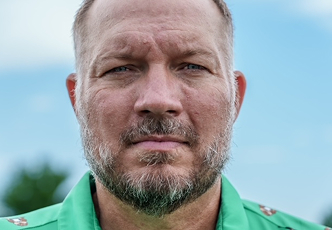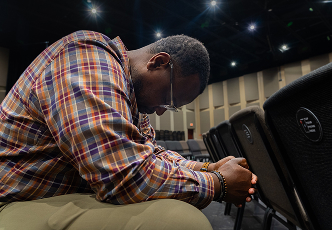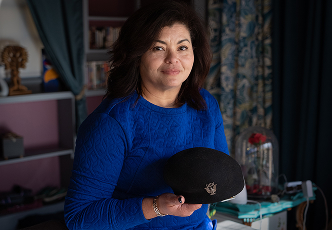Substance Use and PTSD
Sometimes Veterans use alcohol or other drugs to cope with trauma or painful memories. When Veterans struggle with substance use, posttraumatic stress disorder (PTSD) can be the root cause. Find out how evidence-based treatment for PTSD and substance use can help Veterans recover.
What is substance use?
Substance use means using alcohol or other drugs, such as opioids, cannabis, or stimulants like cocaine. Substance use happens on a spectrum, and it’s not always problematic. For example, many people enjoy having a beer or a glass of wine with friends. But some people have a hard time controlling their substance use — for example, they may plan to have just one beer and end up drinking all night.
Substance misuse is when people use substances in ways that are harmful to their health, hurt other people, or make it hard to keep a job or go to school. Substance use disorder (SUD) is a mental health condition that causes people who struggle with substance misuse to have trouble controlling their use of alcohol or other drugs.
Many Veterans can look back and pinpoint a moment when they realized that their substance use was a problem. That moment looks different for everyone. But no matter what challenges you’re facing, evidence-based treatment can help you get better.
I first realized I was misusing drugs because I would say ‘just one more time,’ or [my ex-wife] would say ‘just one more time’…thousands of times. I would look at myself in the mirror and just say, ‘What am I doing?’ That’s when I knew I had a problem.”
Jon Caito (US Army, 2001-2012) describes how he realized that he was misusing substances.
I stopped [drinking] because I had a good conversation with myself. I didn’t like the feeling the next day. I did not like the feeling of not having all my faculties. I knew that my intake of alcohol was going to diminish my reaction time, my judgment, and it was unacceptable to me.”
Will Florez (US Coast Guard, 1988-2010) shares why he decided to stop drinking.
How are PTSD and substance use related?
PTSD and substance use are often connected — but the relationship between them is different for every Veteran.
Many Veterans start using substances to cope with trauma or symptoms of PTSD. Sometimes people call this “self-medicating.” Substance use can make Veterans feel better for a short time, but it can cause other problems. And some Veterans find out that using substances actually makes their PTSD symptoms worse. Some Veterans may first use substances to self-medicate, but over time the cravings or addiction may become the more prominent reasons for using. Regardless of how your PTSD and substance use affect each other, treatment can help.
I used substances to go numb. I wouldn’t say it would completely vanish my PTSD symptoms, but when you stay awake for 5 days at a time on cocaine, you don’t fall asleep, you pass the hell out. And I didn’t remember my nightmares at that point — I was so physically exhausted.”
Jon Caito (US Army, 2001-2012) explains how he used cocaine to cope with PTSD symptoms.
I was sexually assaulted by the senior drill sergeant. And when I got to my first unit, it didn't stop. I think the alcohol use helped me to accept a false narrative that my worth was based on the sexual attention that I received. I think the alcohol use helped me to become numb to that, to accept it, and to hopefully not remember."
Ayla Bennett (US Army, active duty since 2004) shares how she used alcohol to cope with military sexual trauma.
Drinking alcohol allowed me to disconnect from what I just witnessed, from what I just had to do. From the unpleasantness of putting a body into a body bag. Alcohol gave me a little bit of disconnect. It was brief and it came with consequences.”
Will Florez (US Coast Guard, 1988-2010) explains how alcohol allowed him to disconnect from painful memories — at least for a short time.
How PTSD may affect treatment for substance use
Sometimes when Veterans seek out treatment for substance use, it doesn’t work as well as they want or expect it to. This often happens when Veterans don’t know that they have PTSD, and they’ve been using substances to cope with their PTSD symptoms. In fact, many Veterans have gone through substance use treatment but have never been screened for PTSD. Experts now know that the connection between PTSD and substance use is very important. When Veterans get evidence-based PTSD treatment and start to feel better, they may feel less of a need to use substances.
If you’re struggling with substance misuse — especially if substance use treatment hasn’t worked as well as you hoped — consider talking to a doctor or counselor about getting a PTSD screening. You can also take this self-screening quiz to find out if you might have PTSD.
Using cannabis to manage PTSD symptoms
Sometimes Veterans use cannabis to help them manage symptoms of PTSD or other mental health conditions. However, research to date does not support cannabis as an effective treatment for PTSD. Like any other substance, cannabis can be harmful, especially when used over a long period of time. Some people have a hard time controlling how often or how much cannabis they use.
Treatment for PTSD and substance use
You can get an evidence-based treatment for PTSD and substance use at the same time. You don’t have to wait until you’re no longer using substances to address your PTSD symptoms. In fact, treatment works best when it addresses both issues, so that Veterans can get to the root of their challenges.
There are many ways to get treatment for PTSD and substance use at the same time. Your doctor, counselor, or VA case manager can help you make a treatment plan based on what’s available in your area.
Treating PTSD and substance use at the same time (concurrent treatment)
In concurrent treatment, a Veteran completes 2 separate treatments at the same time: a treatment for PTSD and a program for substance use. While that may sound like a lot at first, addressing both conditions can feel empowering — and you’ll have support to help you succeed. Your treatment team will be there to help you address traumatic or painful memories in therapy and manage symptoms related to substance use. You may also meet other Veterans who’ve faced similar challenges, so you’ll know you’re not alone.
Treating PTSD and substance use together (integrated treatment)
In integrated treatment, a Veteran completes a single treatment designed to address both PTSD and substance use.
COPE is one type of integrated treatment that works well to treat both PTSD and substance use problems. The name “COPE” stands for Concurrent Treatment of PTSD and Substance Use Disorders Using Prolonged Exposure. With COPE, Veterans get the benefits of Prolonged Exposure (PE) — a recommended evidence-based treatment for PTSD — as well as substance use treatment. COPE may not be available at all VA locations.
Having those therapies at the same time, I believe it was very helpful doing them together just because I got to see both sides of it. I got to see, all right, I have a drinking problem, all right, I have PTSD. How did I deal with PTSD? I drank. And then you add two and two together, you get four, and you're like, ‘Oh my god, so I've been masking the PTSD with my excessive drinking.’”
Chris Swift (US Army, 1999-2011) explains how concurrent treatment for PTSD and substance use helped him make the connection between his PTSD symptoms and drinking.
I believe that it was important to address alcohol and PTSD together because even if I didn't realize it, they fed into each other in a very unhealthy manner. I didn't realize it until [my therapist] helped me to analyze my day-to-day lifestyle and how the negative choices I was making with substance abuse were negatively affecting so many aspects of my life. Had we not addressed the alcohol and the PTSD together, I don't believe that there would've been improvement like there is now in either area.”
Ayla Bennett (US Army, active duty since 2004) shares how integrated treatment for PTSD and substance use helped her make progress.
Using medicine to help treat substance use
When people stop taking substances or try to use less, they often notice changes in how they think and feel. There are medicines that can help reduce cravings, withdrawal symptoms, and other distracting or painful thoughts or sensations so that Veterans can feel better and focus on getting the most out of treatment.
Recovery is possible — and the right treatment can help
No matter what you’re going through, even if you have tried treatment before, there is hope. Evidence-based treatment for PTSD and substance use has helped many Veterans, and it can help you feel better.
Many Veterans face barriers to treatment. Both PTSD and substance use still carry stigma in our society, and some Veterans may feel ashamed to ask for help. The day-to-day challenges that often come with PTSD and substance use can also make it hard to keep a job or maintain a strong support system. And when you’re using all your energy to get through the day, it can feel impossible to make decisions about the future.
But no matter what obstacles you’re facing, remember that help is available. There are Veterans recovering from PTSD and substance use every day. You can be one of them. You deserve to feel better, and evidence-based treatment can help you get there.
I didn't care about anything else except ‘where's my next eight ball of cocaine coming from,’ and that's not a life. Now I have choices. Now I can feel free to do things that I actually enjoy, and it makes a world of difference. Just learning about PTSD and knowing there are other people out there like me was a huge difference.”
Jon Caito (US Army, 2001-2012) says learning about PTSD and getting treatment has given him the freedom to enjoy life again.
Serving in the military has taught me to deal with a lot of unpleasant things, and we have a saying, ‘embrace the suck.’ If you've ever embraced the suck in any shape, form, or fashion, then you can do this for yourself. Because living a life guilt-free of your past horrors or your past traumas is worth the suck. Being able to sit with myself for the first time in my life, it's a journey I wish I had started so many years ago.”
Ayla Bennett (US Army, active duty since 2004) reflects on how embracing the hard parts of treatment helped her heal from PTSD and substance use.
With all the different therapies and all the different classes and groups and programs that they have out there, just get as many tools as you can and just keep getting better and better and better. I would bet my life on this. If you do those things, you get the help, you get better. You get on that road to recovery, life is going to get better and better every day.”
Chris Swift (US Army, 1999-2011) encourages Veterans to take advantage of all the tools available to help them recover.
Hear Veterans’ stories
Learn how substance use impacted these Veterans — and how getting treatment for substance use and PTSD made a positive difference in their lives.
[Treatment] has been groundbreaking.
Ayla L. Bennett
US Army 2004 - Present
How did I deal with PTSD? I drank.
Chris Swift
US Army 1999-2011

Want to learn more?
Check out these videos featuring Veterans who have benefitted from treatment for substance use and PTSD.
Ready to take the next step?
Read more about substance use treatment
Learn more about substance use treatment and how Veterans can get help through VA.
Read about PTSD therapies
Learn about different types of therapy that can help Veterans with PTSD.
Check out VetChange
Discover VetChange, a free, confidential online program that can help Veterans cut back or stop drinking.
Get the VetChange app
Download the app so you can use VetChange anytime, anywhere.


